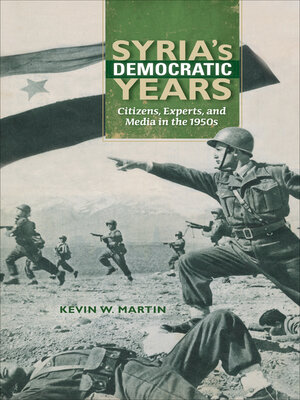Syria's Democratic Years
ebook ∣ Citizens, Experts, and Media in the 1950s · Encounters: Explorations in Folklore and Ethnomusicology
By Kevin W. Martin

Sign up to save your library
With an OverDrive account, you can save your favorite libraries for at-a-glance information about availability. Find out more about OverDrive accounts.
Find this title in Libby, the library reading app by OverDrive.



Search for a digital library with this title
Title found at these libraries:
| Library Name | Distance |
|---|---|
| Loading... |
This study of mid-20th century Syria blends “cultural theory and comparative history” to offer “intellectual depth and relevance beyond the case at hand” (The Middle East Journal).
When Syria became fully independent in 1946, the young republic faced the task of forging a new national identity. From 1954 to 1958, Syria enjoyed a brief period of civilian government—popularly known as “The Democratic Years”—before the consolidation of authoritarian rule. In Syria’s Democratic Years, Kevin W. Martin provides a cultural history of the period and argues that the authoritarian outcome was anything but inevitable.
Examining the flourishing broadcast and print media of the time, Martin focuses on three public figures, whose professions—law, the military, and medicine—projected modernity and modeled the new Arab citizen. This experiment with democracy, however abortive, offers a model of governance from Syria’s historical experience that could serve as an alternative to dictatorship.
When Syria became fully independent in 1946, the young republic faced the task of forging a new national identity. From 1954 to 1958, Syria enjoyed a brief period of civilian government—popularly known as “The Democratic Years”—before the consolidation of authoritarian rule. In Syria’s Democratic Years, Kevin W. Martin provides a cultural history of the period and argues that the authoritarian outcome was anything but inevitable.
Examining the flourishing broadcast and print media of the time, Martin focuses on three public figures, whose professions—law, the military, and medicine—projected modernity and modeled the new Arab citizen. This experiment with democracy, however abortive, offers a model of governance from Syria’s historical experience that could serve as an alternative to dictatorship.







